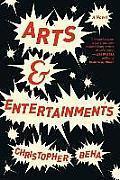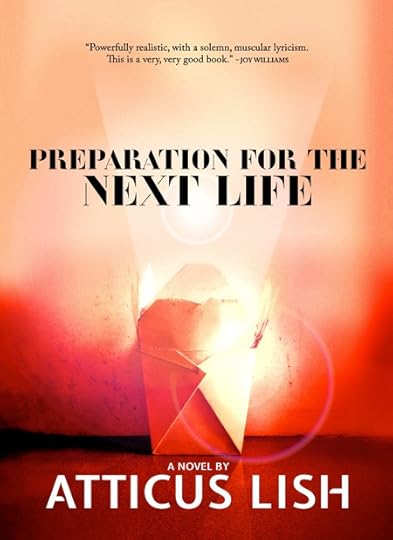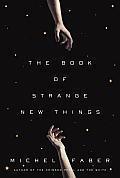Year End Fiction Wrap-up: Beha, Lish, Faber
 Arts & Entertainents by Chris Beha
Arts & Entertainents by Chris Beha
I think I didn’t write about Chris Beha’s phenomenally good Arts & Entertainments when it was released simply because of Twitter and the echo it offers, the sense that (at least in my own life/experience) whatever it is you’re excited about is already generally, obviously known. Lots of folks, anyway, that I read on Twitter were talking about the book already, and so it seemed silly to���as if at some bonfire���just toss another It’s Great! Read It! log on the who-could-miss-it-fire.
But it’s been several months since the book’s release, and it’s still not only a phenomenally good book but, now, a lasting one: it’s a story of Eddie Hartley, “Handsome” Eddie Hartley, an early-30s drama teacher at the private/posh boys academy he himself graduated from 15 yrs back, but Eddie’s there because of a fall: he’d expected a career as an actor, a career his ex-girlfriend Martha has gone on to great success in (as the title character in a hugely popular TV show Dr. Drake) while Eddie has married Susan and sort of fumbled along, gathering debt (as Manhattanites seem impelled to) and trying to get by. The book snaps into its (awesomely constructed) plot at the introduction of two things: 1. Eddie and Susan hve fertility issues (which, for those unversed, means $) and 2. Eddie’s got let’s call it ‘compromising’ video of Martha, from before she was famous. So, obviously: problem and solution, right?
In lesser hands, maybe that’s the book’s entirety: Eddie (who���like Susan and Martha and Morgan [the old friend Eddie sells his ex’s sex-tape to] and everyone in this book���is just exceptionally well-rendered: Beha’s an editor at Harper’s, so it’s not *that* surprising that the book’s sharply written and engaging [plus he’s got a previous novel and book of nonfiction, meaning: dude’s run the track well before], but one’s day-job means nil re: one’s capacity to draw such full-of-blood characters, a talent Beha’s just lights-out good at) leaks the tape, conflicts ensue, eventually everything resolves. In the broadest strokes this is what happens in Arts and Entertainments, but in the process Beha engages the reader in awesomely uncomfortable ways, namely: what is it we want from our stories? That’s the deepest question he’s working here, but there’s a raft of others, from the demands we make upon the actors we’re transfixed by, to the ugly sin-and-redemption split-story driving so much contemporary entertainment to���for me the meatiest part���the toxically entertaining hellhole of reality television. Here’s where Beha shines most, I think���Handsome Eddie ends up in a reality TV show centered on his own life, as does his wife, and the machinations behind the shows are not only plenty believable but sort of gutting (at least for those of us entertained enough by reality TV to know off-hand, for instance, that the next season of The Bachelor starts January 5th), plus also humiliating: we’re so easy.
That, weirdly, is the humbling and heartening take-away from the book, I’d argue: we’re so easy, all of us. We want story. We want conflict and resolution, sin and redemption, and we’re willing to suspend all manner of disbelief and shoulda-known-better hunches to get our dosage of such, and Beha’s masterful Arts & Entertainments is as much a good story leavened well with the usual key and great ingredients as it is an astonishing mirror reflecting right back at us, showing us ourselves in all our silly hopeful wanting and yet���amazingly���not faulting us for wanting it all, for wanting to see it all but still believe.
��
 Preparations for the Next Life
by Atticus Lish
Preparations for the Next Life
by Atticus Lish
Is it time to saint Giancarlo DeTrapano yet? Seems like it. Check the dude’s track record: Scott McClanahan’s Hill William and Kimball’s Us and Butler’s Sky Saw and Calloway’s shuts-down-a-printing-press-because-maybe-obscenity what purpose did i serve in your life and now Preparations for the Next Life which has been heralded by damn near everyone, Garner earlier and Clancy Martin in some wknd’s NYTimes and have you read this fucking thing? Have you read this gorgeous book? The adjectives run out fairly quickly: lots of reviews emphasize the sentences, which is legit and great, the propulsive writing or whatever, but mostly what it feels like is an almost perfect scenario: writing that’s entirely without fat in service of a story that’s achingly, tenderly wandering. Which isn’t to say the sentences are brutally brief or anything. Here’s at random (p124): “He was from a place called Shayler, which he described as pretty basic. There were bars, Lutheran churches, and a 7-11. When he said home, he pronounced it hoeme. The houses went up a hill, like a mining hill, close to West Virginia. Under the highway going into town were mountains of gray gravel. A lot of bars, a lot of drinking. Steel Town football was big. People were pretty racist. But they were open about it. They could be friends with anyone. That’s just how they were.” That music, that totality, that far-reach+apologyless full painting: that’s why you can’t put Preparation for the Next Life down. Skinner and Zou Lei are glorious, and their story’s gorgeous and heart-expanding.
 The Book of Strange New Things
by Michel Faber
The Book of Strange New Things
by Michel Faber
I’d never read Faber before, and then this novel hit this autumn and it seemed like you couldn’t avoid mention of it, plus the fact that, in the writing of this book (about distance, loss, religion and science, forgiveness), Faber actually lost his beloved wife, and here’s the thing: The Book of Strange New Things is among the most expansive and beautiful homes of a book of I’ve ever read, and not only that, but the thing’s so open, so honest: among the very first scenes, Peter and his wife Bea pull over and have sex in their car on their way to the airport, from which Peter’s about to depart for a long, long while. It’s not some porny moment: it’s a husband and wife attempting to hit that flint of intimacy again, but Peter is struck wondering by their encounter, afterward, fearful he didn’t satisfy his wife, anxious of what such a let-down (according to him: she waves off his anxieties when he airs them, but that’s hardly enough) portends. What’s most startling about this very (to me; maybe I’m just not reading enough) startling opening is that, in grounding the book in the banalities and tiny dramas of domesticity and love, Faber eventually presents an outer-space drama, replete with aliens and interstellar travel, as more understandable���or maybe not more but equally, certainly���than the small-scale stuff of each of our lives. Think of that. The best books should make your insides feel sudden, surprising, fragile amazements you overlook too often (should make whats outside feel that way too, I suppose, but the outside world’s offering plenty of evidence regular re that), and Faber’s The Book of Strange New Things does just that, plus more: it actually, hand-on-my-heart, makes you glad to be alive + opens you wide to wonder. Good lord, what a book.




